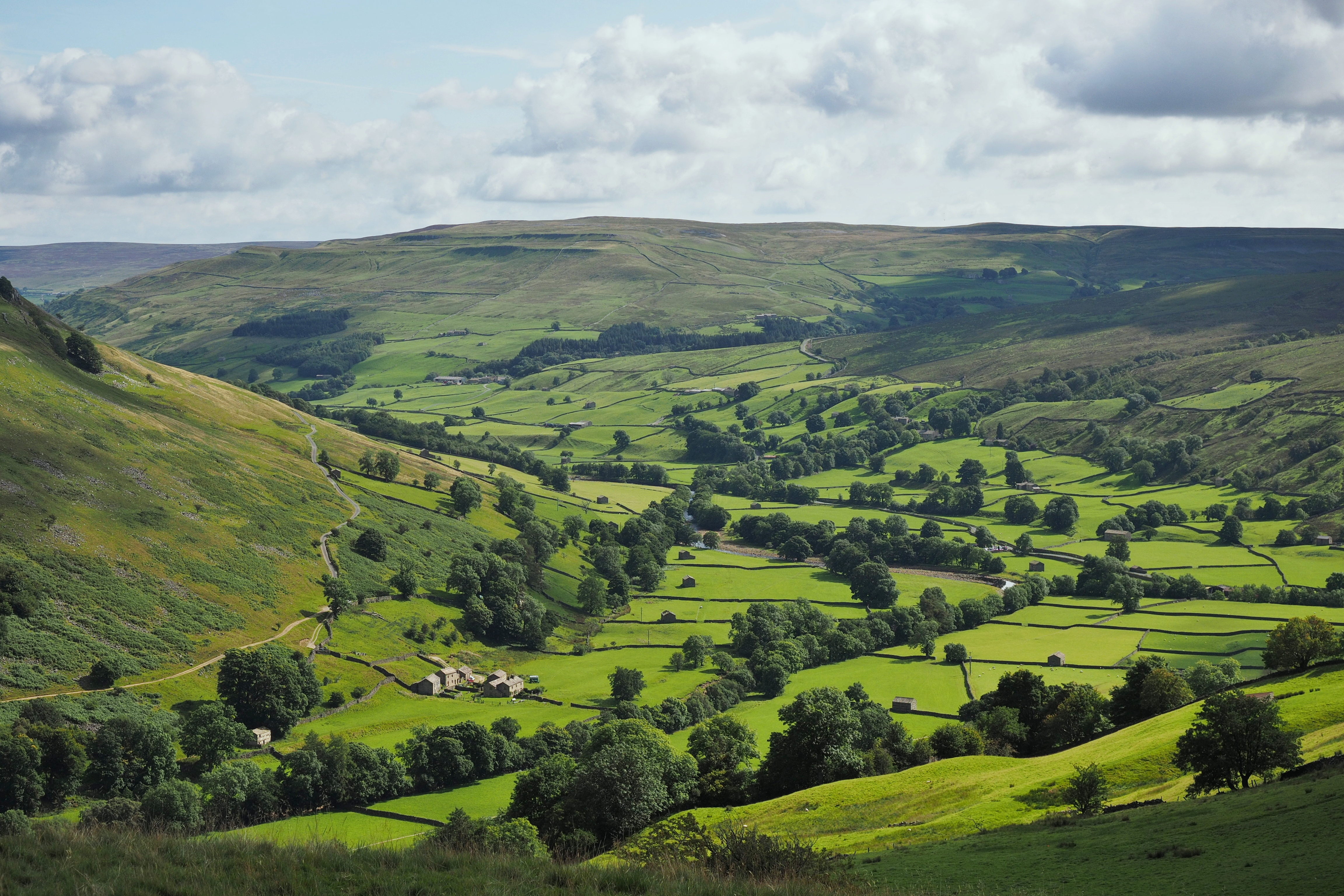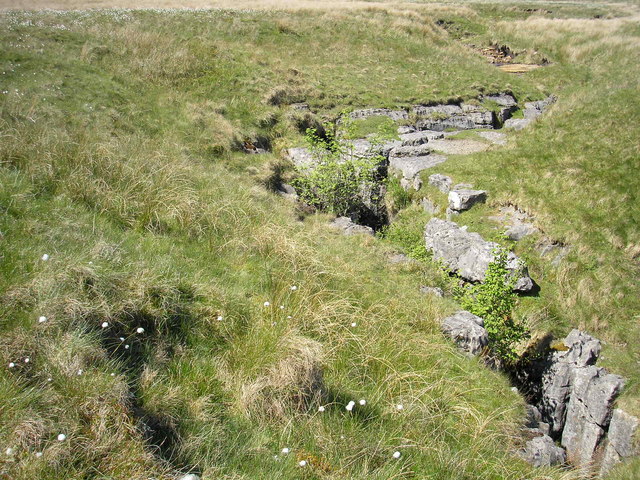|
Titan Shaft
Titan is a natural cavern near Castleton in the Derbyshire Peak District, and is the deepest shaft of any known cave in Britain, at . The existence of Titan was revealed in November 2006, following its discovery on 1 January 1999 after cavers discovered connections from the James Hall Over Engine Mine to both Speedwell Cavern and Peak Cavern. Previously, the deepest known underground shaft in Britain had been Gaping Gill on the slopes of Ingleborough in the Yorkshire Dales. A group of Peak District cavers discovered the shaft after finding an account by an 18th-century academic, James Plumtree, in a university library. Initial explorations in the James Hall Over Engine Mine led to the discovery of a large shaft named Leviathan, before further excavations revealed the existence of Titan. History In 1793 Plumtree wrote a paper describing a network of passages and shafts that went beyond the well-known Speedwell Cave/Mine system near Castleton. His account took him down the ... [...More Info...] [...Related Items...] OR: [Wikipedia] [Google] [Baidu] |
Speedwell Cavern
Speedwell Cavern is one of the four show caves in Castleton, Derbyshire, England. The cave system consists of a horizontal lead miners' adit (a level passageway driven horizontally into the hillside) 200 metres below ground leading to the cavern itself, a limestone cave. The narrow adit is permanently flooded, so after descending a long staircase, access to the cave is made by boat. At the end of the adit, the cavern opens up with fluorspar veins, stalactites and stalagmites, and the so-called "Bottomless Pit". This chamber has an underground lake with a high waterfall and an extremely deep vertical shaft, now choked to within of the surface by rock spoil dumped by miners. The original depth of the shaft has been estimated, from the amount of spoil placed in the shaft over the years, at around . The mine was developed in the 1770s but the limited lead ore deposits meant that it was not profitable and it was closed down by 1790. At the foot of Winnats Pass, it is a tourist at ... [...More Info...] [...Related Items...] OR: [Wikipedia] [Google] [Baidu] |
Gaping Gill
Gaping Gill (also known as Gaping Ghyll) is a natural cave in North Yorkshire, England. It is one of the unmistakable landmarks on the southern slopes of Ingleborough – a deep pothole with the stream Fell Beck flowing into it. After falling through one of the largest known underground chambers in Britain, the water disappears into the bouldery floor and eventually resurges adjacent to Ingleborough Cave. The shaft was the deepest known in Britain, until Titan in Derbyshire was discovered in 1999. Gaping Gill still retains the records for the highest unbroken waterfall in England and the largest underground chamber naturally open to the surface. Features Due to the number of entrances which connect into the cave, many different routes through and around the system are possible. Other entrances include Jib Tunnel, Disappointment Pot, Stream Passage Pot, Bar Pot, Hensler's Pot, Corky's Pot, Rat Hole, and Flood Entrance Pot. The Bradford Pothole Club around Whitsun May ... [...More Info...] [...Related Items...] OR: [Wikipedia] [Google] [Baidu] |
PEAK CAVERN, CASTLETON
Peak or The Peak may refer to: Basic meanings Geology * Mountain peak ** Pyramidal peak, a mountaintop that has been sculpted by erosion to form a point Mathematics * Peak hour or rush hour, in traffic congestion * Peak (geometry), an (''n''-3)-dimensional element of a polytope * Peak electricity demand or peak usage * Peak-to-peak, the highest (or sometimes the highest and lowest) points on a varying waveform * Peak (pharmacology), the time at which a drug reaches its maximum plasma concentration * Peak experience, psychological term for a euphoric mental state Resource production In terms of resource production, the peak is the moment when the production of a resource reaches a maximum level, after which it declines; in particular see: * Peak oil * Peak car * Peak coal * Peak copper * Peak farmland * Peak gas * Peak gold * Peak minerals * Peak phosphorus * Peak uranium * Peak water * Peak wheat * Peak wood Other basic meanings * Visor, a part of a hat, known as a "peak" in Britis ... [...More Info...] [...Related Items...] OR: [Wikipedia] [Google] [Baidu] |
Miner
A miner is a person who extracts ore, coal, chalk, clay, or other minerals from the earth through mining. There are two senses in which the term is used. In its narrowest sense, a miner is someone who works at the rock face; cutting, blasting, or otherwise working and removing the rock. In a broader sense, a "miner" is anyone working within a mine, not just a worker at the rock face. Mining is one of the most dangerous trades in the world. In some countries, miners lack social guarantees and in case of injury may be left to cope without assistance. In regions with a long mining tradition, many communities have developed cultural traditions and aspects specific to the various regions, in the forms of particular equipment, symbolism, music, and the like. Roles Different functions of the individual miner. Many of the roles are specific to a type of mining, such as coal mining. Roles considered to be "miners" in the narrower sense have included: *Hewer (also known as "cake" or "pi ... [...More Info...] [...Related Items...] OR: [Wikipedia] [Google] [Baidu] |
Farming
Agriculture or farming is the practice of cultivating plants and livestock. Agriculture was the key development in the rise of sedentary human civilization, whereby farming of domesticated species created food surpluses that enabled people to live in cities. The history of agriculture began thousands of years ago. After gathering wild grains beginning at least 105,000 years ago, nascent farmers began to plant them around 11,500 years ago. Sheep, goats, pigs and cattle were domesticated over 10,000 years ago. Plants were independently cultivated in at least 11 regions of the world. Industrial agriculture based on large-scale monoculture in the twentieth century came to dominate agricultural output, though about 2 billion people still depended on subsistence agriculture. The major agricultural products can be broadly grouped into foods, fibers, fuels, and raw materials (such as rubber). Food classes include cereals (grains), vegetables, fruits, cooking oils, meat, milk, e ... [...More Info...] [...Related Items...] OR: [Wikipedia] [Google] [Baidu] |
Lead
Lead is a chemical element with the symbol Pb (from the Latin ) and atomic number 82. It is a heavy metal that is denser than most common materials. Lead is soft and malleable, and also has a relatively low melting point. When freshly cut, lead is a shiny gray with a hint of blue. It tarnishes to a dull gray color when exposed to air. Lead has the highest atomic number of any stable element and three of its isotopes are endpoints of major nuclear decay chains of heavier elements. Lead is toxic, even in small amounts, especially to children. Lead is a relatively unreactive post-transition metal. Its weak metallic character is illustrated by its amphoteric nature; lead and lead oxides react with acids and bases, and it tends to form covalent bonds. Compounds of lead are usually found in the +2 oxidation state rather than the +4 state common with lighter members of the carbon group. Exceptions are mostly limited to organolead compounds. Like the lighter members of the ... [...More Info...] [...Related Items...] OR: [Wikipedia] [Google] [Baidu] |
Leviathan (cave)
Leviathan ( ; he, לִוְיָתָן, Līvyāṯān) is a sea serpent noted in theology and mythology. It is referenced in several books of the Hebrew Bible, including Psalms, the Book of Job, the Book of Isaiah, the Book of Amos, and, according to some translations, in the Book of Jonah; it is also mentioned in the Book of Enoch. The Leviathan is often an embodiment of chaos and threatening to eat the damned after their life. In the end, it is annihilated. Christian theologians identified Leviathan with the demon of the deadly sin, envy. According to Ophite diagrams, the Leviathan encapsulates the space of the material world. The Leviathan of the Book of Job is a reflection of the older Canaanite ''Lotan'', a primeval monster defeated by the god Baal Hadad. Parallels to the role of Mesopotamian Tiamat defeated by Marduk have long been drawn in comparative mythology, as have been wider comparisons to dragon and world serpent narratives such as Indra slaying Vrtra or Thor ... [...More Info...] [...Related Items...] OR: [Wikipedia] [Google] [Baidu] |
Yorkshire Dales
The Yorkshire Dales is an upland area of the Pennines in the Historic counties of England, historic county of Yorkshire, England, most of it in the Yorkshire Dales National Park created in 1954. The Dales comprise river valleys and the hills rising from the Vale of York westwards to the hilltops of the Pennine Drainage divide, watershed. In Ribblesdale, Dentdale and Garsdale, the area extends westwards across the watershed, but most of the valleys drain eastwards to the Vale of York, into the River Ouse, Yorkshire, Ouse and the Humber. The extensive limestone cave systems are a major area for caving in the UK and numerous walking trails run through the hills and dales. Etymology The word ''Dale (landform), dale'', like ''dell'', is derived from the Old English word ''dæl''. It has cognates in the North Germanic languages, Nordic/Germanic languages, Germanic words for valley (''dal'', ''tal''), and occurs in valley names across Yorkshire and Northern England. Usage here may have ... [...More Info...] [...Related Items...] OR: [Wikipedia] [Google] [Baidu] |
Ingleborough
Ingleborough () is the second-highest mountain in the Yorkshire Dales, England. It is one of the Yorkshire Three Peaks (the other two being Whernside and Pen-y-ghent), and is frequently climbed as part of the Three Peaks walk. A large part of Ingleborough is designated as a Site of Special Scientific Interest and National Nature Reserve and is the home of a new joint project, Wild Ingleborough, with aims to improve the landscape for wildlife and people. Name The first element of the name "Ingleborough" has been variably explained as a Scots term for 'beacon, fire', an Old Danish term meaning 'English' or a derivative of Old English ''ing'', 'peak'. The second element is derived from the Old English word ''burh'', meaning "a fortified place"; in this case, a hill fort. The summit plateau of Ingleborough is encircled by the remains of a massive stone rampart, containing the foundations of Iron Age huts. Geography Ingleborough is in the south-western corner of the Yorkshi ... [...More Info...] [...Related Items...] OR: [Wikipedia] [Google] [Baidu] |
Peak Cavern
The Peak Cavern, also known as the Devil's Arse, is one of the four show caves in Castleton, Derbyshire, England. Peakshole Water flows through and out of the cave, which has the largest cave entrance in Britain. Overview Unlike the other show caves in the area, Peak Cavern is almost entirely natural; the only artificial part of the cave was blasted to bypass a low tunnel that was only accessible by lying down on a boat. The cave system is the largest in the Peak District, and the main entrance is the largest cave entrance in Britain. Until 1915, the cave was home to some of Britain's lastThe cave-houses at Kinver Edge near Kidderminster were populated until the 1950s. troglodytes, who lived in houses built inside the cave mouth and made a living from rope making, while the depths of the cave were known as a haven for bandits. In legend, it was where thieves' cant was created by a meeting between Cock Lorel, leader of the rogues, and Giles Hather, the King of the Gypsies. ... [...More Info...] [...Related Items...] OR: [Wikipedia] [Google] [Baidu] |
Castleton, Derbyshire
Castleton is a village in the High Peak district of Derbyshire, England, at the western end of the Hope Valley on the Peakshole Water, a tributary of the River Noe, between the Dark Peak to the north and the White Peak to the south. The population was 642 at the 2011 Census. History Castleton village was mentioned as ''Pechesers'' in Domesday Book in 1086 where "Arnbiorn and Hundingr held the land of William Peverel's castle in Castleton".''Domesday Book: A Complete Translation''. London: Penguin, 2003. p.750 This land and Peverel's castle were amongst the manors belonging to William Peverel that also included Bolsover and Glapwell. St Edmund's Norman church was restored about 1837. It has late 13th-century tracery and an ashlar-faced Perpendicular tower. Its box pews are dated 1661, 1662, 1663 and 1676. A medieval leper hospital (the Hospital of Saint Mary in the Peak) is thought to have been on the eastern boundary of Castleton, though some locals believe it to ... [...More Info...] [...Related Items...] OR: [Wikipedia] [Google] [Baidu] |
James Hall Over Engine Mine
James is a common English language surname and given name: *James (name), the typically masculine first name James * James (surname), various people with the last name James James or James City may also refer to: People * King James (other), various kings named James * Saint James (other) * James (musician) * James, brother of Jesus Places Canada * James Bay, a large body of water * James, Ontario United Kingdom * James College, a college of the University of York United States * James, Georgia, an unincorporated community * James, Iowa, an unincorporated community * James City, North Carolina * James City County, Virginia ** James City (Virginia Company) ** James City Shire * James City, Pennsylvania * St. James City, Florida Arts, entertainment, and media * ''James'' (2005 film), a Bollywood film * ''James'' (2008 film), an Irish short film * ''James'' (2022 film), an Indian Kannada-language film * James the Red Engine, a character in ''Thomas the Tank ... [...More Info...] [...Related Items...] OR: [Wikipedia] [Google] [Baidu] |







